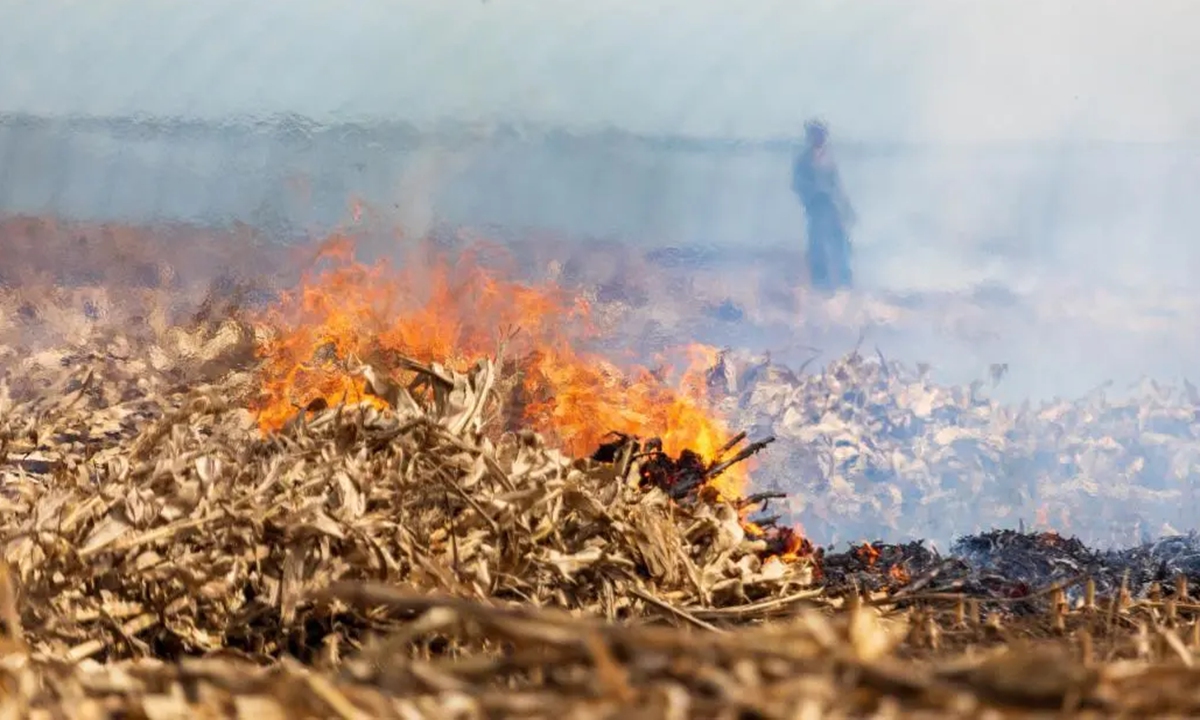
Straw burning in rural China. Photo from web
Some cities in Central China's Hunan Province recently have shifted from a "full ban on straw burning" to a "restricted burning by designated zones,
mk" the Global Times found on Monday. One of the cities attributed the policy shift to reducing the burden on local grass-roots levels.
According to a latest announcement by the government of Jinshi, open-air burning of straws, including straws from crops such as rice, rapeseed, cotton and corn that easily cause smoke and dust pollution, such as fallen leaves, is completely prohibited in certain areas of the city.
The announcement clarifies that areas not part of the prohibition zone are designated as restricted burning zones. During periods of heavy pollution weather alerts in these zones, open-air straw burning is prohibited, while at other times, burning can be organized in an orderly manner, it said.
Jinshi issued an announcement in 2017, prohibiting open-air straw burning within the city's administrative boundaries.
The Global Times found that some other areas in Hunan such as Yiyang and Zhangjiajie have also been designating straw burning prohibition zones and restricted burning zones.
For example, the local government of Taojiang county in Yiyang divided the 15 townships under its jurisdiction into no-burning zones and limited-burning zones.
The policy shift from a complete ban to restrictions aims to reduce the burden on local authorities, according to announcement of Jinshi government, which is under administration of Changde city.
Changde ecology and environment bureau said in in a reply to deputies of the city level people's congresse that under the comprehensive ban on straw burning, each fire point detected by satellite will lead to financial deductions of 100,000 yuan ($14,080). This has placed pressure on agricultural production and local government operations. The city plans to differentiate the zones and carry out orderly straw burning.
The prohibition of open-air burning of crop straws was adopted as a key task in the battle of air pollution prevention and control. However, this policy is difficult to implement and farmers do not understand and oppose it.
Changde government also emphasized to promote the comprehensive utilization of crop straws as a necessary method to process the straws given the burning ban. Changde had a theoretical resource amount of 5.1 million tons of crop straws in 2021, with a collectible resource amount of 3.76 million tons.
To achieve this goal, the city has implemented several measures, including introducing companies specialized in straw utilization and encouraging the establishment of straw transfer centers for every 20,000 acres of farmland within designated no-burn zones in cities and counties. Additionally, the local government promotes the gradual expansion of straw utilization as solid fuel, reducing the proportion of direct burning by farmers, and advancing the demonstration and application of new technologies, equipment, and processes.
Across the country, there is no unified policy regarding straw burning but some other provinces and regions, including East China's Shandong Province and Guangxi Zhuang Autonomous Region also differentiate complete ban zones and registricted burning zones.
Through the promotion of the straw burning ban over the years, most farmers have developed an awareness of not burning straw, a joint working team of the Ecoloy and Environment Ministry and the Agriculture and Rural Affairs Ministry found in 2023.
The team emphasized to place greater emphasis on the comprehensive utilization of straw, make breakthroughs in technologies to increase the economic values of straws, truly transforming straw from "waste" into "treasure," the investigation team said.
Global Times

